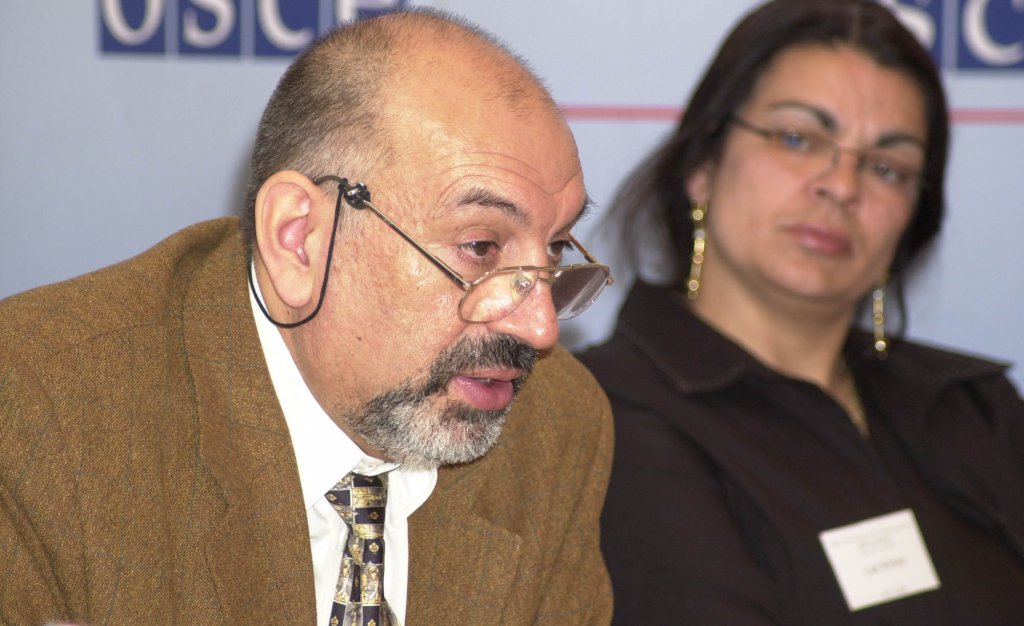Remembering Nicolae Gheorghe
13 October 2014
The passing of Nicolae Gheorghe, on 8 August last year, profoundly shocked and saddened all who were privileged to know him.

Photo credit: OSCE
In an autobiographical aside in one of his final essays, Choices to be made and prices to be paid, Nicolae stated “I grew up as part of a group in which Romani was not spoken as a first language, my relatives did not live in extended families and my parents did not follow traditional occupations … Our identity and memories of being ţigan were based more on the experience of discrimination and external stereotypes, less on commonly shared meanings of being Roma in a vernacular, ethnic sense.”
As to the dilemmas of living with difference day by day he “decided at a certain moment of my life that I am a Rom, although I was not necessarily obliged to be. Activism meant an opportunity to come to terms with the meaning and heritage of being ţigan. To relieve the tensions that went along with using this category, I affirmed my social and cultural background and projected it on to Roma social history and culture.”
It would be difficult to do justice to the full range of Nicolae’s vivid and vital intellectual contributions to debates around Roma emancipation, integration, and how best to combat racism and prejudice in our societies. As an engaged cosmopolitan public intellectual, an activist and a diplomat, a humanist and an indefatigable defender of fundamental rights, Nicolae’s contributions inspired and informed all who encountered him.
Committed to stirring debate and gifted with a somewhat heretical sense of humour, Nicolae’s public contributions often managed to irritate some, and delight and inspire others. At conferences his relentless pursuit of open and frank debate around so-called sensitive issues often provoked consternation among those less inclined towards openness.
While those wedded to ideology and orthodoxy might fulminate, more open minds relished his interventions. I witnessed many a hapless conference moderator sit back, smile, wave his hands in resignation, and submit as Nicolae exceeded his allotted two minutes to pursue a particular line of argument, demolish received wisdom, and bring the room alive by generating a wave of animated responses. The stark and vivid contrast between Nicolae’s insights and the banal cant that is the commoner currency of the conference circuit always make an impression, prompting many of us to question our assumptions.
Such actions were far removed from the antics of a wilful contrarian. Nicolae was deadly serious in his pursuit of a shared vocabulary based on solidarity and a desire for change, and in his striving for an answer to the question: “How can we make better and decent lives, not just for ourselves, our families and the ‘Roma people’ as a whole, but also for others with whom we live together – our non-Roma fellow citizens?”
Nicolae was emphatic in his insistence that while racist discrimination has been decisive throughout Roma history, it does not exhaust its entirety. The past and present of diverse Roma communities cannot be reduced to victimization. In the search for viable solutions, he suggested that the way out of the vicious circle of blaming an undifferentiated racist ‘other’ and making claims merely on the grounds of eternal Roma victimhood is to take into account our shared responsibilities, acknowledge controversies within Roma communities, and identify common concerns “beyond the general and oversimplified categories of Roma and non-Roma.”
In an especially poignant reflection in this final essay on his twenty-odd years of ‘imagined cosmopolitanism’ working in many countries, and managing his life living out of a suitcase, Nicolae stated: “After two decades of mobility working with international organizations, I am back in Romania. Yet throughout my life I have maintained my genuine allegiance to my Romanian citizenship, to my home and family in this country.”
His passing was a huge loss. His was a unique presence, he was a very dear person, and we will not see the likes of him again. As we mark the first anniversary of his passing with sadness, we remember his seminal contributions to Romani activism, his intellectual rigour and political leadership, and his international diplomacy to make the world sit up and listen to the voices of Roma. Such a profound legacy will continue to inspire and inform others for a long time to come.
(The current issue of Roma Rights is a special issue dedicated to the life and work of Nicolae entitled In Search of a Contemporary Roma Identity: In Memoriam - Nicolae Gheorghe)




